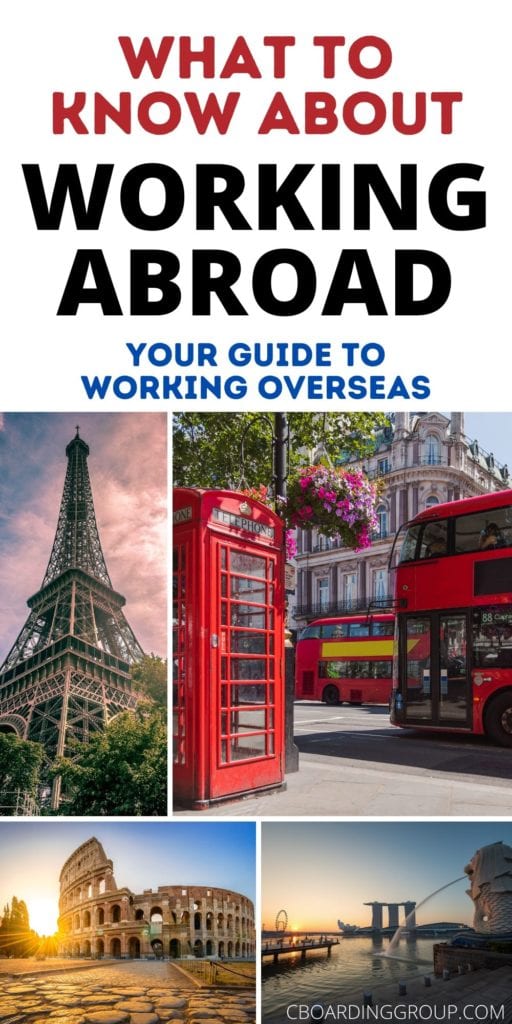If you love new adventures and the standard nine to five just isn’t cutting it anymore, have you considered looking overseas for your next job opportunity? We examine why you should consider working overseas, how working abroad can can be one of the best things you ever do, and what to consider when working overseas.
Many people dismiss the idea of working abroad as an unattainable pipe dream, often seeing it as being completely out of reach for their line of work. But in most cases, that couldn’t be further from the truth.
In fact, for certain countries, it can be easier to find a job there if you work in a particular field and the reality is there’s almost always somewhere you can go no matter your area of expertise. Given the amazing advantages of working overseas, even for only a few years, it’s definitely something you should consider – and I explain why and how to start your work abroad adventure.
This is a guest post from Anna, a personal finance blogger at LogicalDollar whose mission is to help as many people as possible reach financial freedom. She’s also lived in seven countries, traveled to 55 of them and is a fierce advocate of people breaking out of their comfort zone – in a financially responsible way, of course. Would you like to contribute to the CBoardingGroup? Learn how here.
Pin Me for Later:

Working Abroad: Is this really a good idea?
In many cases, your salary can be higher (sometimes significantly so) and taxes may be more advantageous for you. In addition, overseas experience is looked on extremely favorably by companies in all fields.
But the best part, at least for me, is the travel opportunities. I’ve lived in North America, Europe, the Middle East and Australia over the past ten years, which has given me the chance to see places that I never would have visited otherwise.

After all, it’s much easier (and cheaper!) to go for a long weekend on safari in Kenya, hiking in Kazakhstan or wandering through a market in Iran when you’re flying from Dubai, compared to the hours and hours on a plane it takes to get there from Australia or North America.
Not to mention the thousands of dollars these kinds of adventures can cost you when you’re starting your journey from the other side of the world.
And the same can be said for hopping on a train in northern Europe and, in a few hours, ending up in Paris, London, Amsterdam or Berlin. Or taking a bus from Bangkok and ending up on an idyllic beach later that day.
The once-in-a-lifetime trips that many of us only dream about can become your weekend reality when you’re living basically around the corner from these kinds of places.
You can even do short term overseas gigs – potentially at your current employer depending on their remote work policy. Many people are taking advantage of a new trend called workationing. Some people are even getting their citizenship papers in foreign countries to make it easier to travel there or even move there. In fact, you can even buy your citizenship in some countries (along with a 2nd passport, by the way).
Where do I find overseas jobs?
If you are ready to start your overseas travel job there are a multitude of places to look, here’s a few suggestions:
- Go Overseas
- Working Abroad
- Find either a country or company you like and look for jobs at that respective company in that country
What to consider when working overseas
Hold up. This isn’t simply a case of jumping on a plane and waking up in your new, foreign life. Having now moved a number of times to various countries all over the world, there are a few things I always recommend people to consider before they do the same. Here’s a few practical considerations when considering working overseas.
Note: We are not financial, investment or tax advisors. Always consult a licensed professional.
1. Can you get a working visa?
If you don’t hold a second passport in the country to which you’re looking into moving, getting a valid visa for that country is going to be your biggest initial hurdle.
Many people consider this one of the worst parts of moving abroad. For some, you’ll have to reapply every year in countries that aren’t always completely transparent on how to qualify.
And if you lose your job or the rules suddenly change, you may be forced to leave the country relatively quickly.

Fortunately, this hasn’t happened to me, but having money set aside for visa applications or, touch wood, having to move on short notice is always a good idea.
You’ll also need to find a country that will actually take you. In the EU, for example, this can be hard to do as they’re often legally required to favor citizens.
On the other hand, countries like Australia actually have a list of certain jobs for which getting a working visa is easier if you’re considered “skilled†in that field. And in the UAE, they can basically grant a visa to anyone who manages to secure a job there.
So do some Googling in relation to your field of work and the countries in which you’re interested, just to see what options may be available to you.
2. Check your tax obligations
This is going to be very country-dependent but, as a general rule, knowing your tax obligations for both your country of destination and, in some cases, your home country is extremely important before deciding to move overseas.
Most countries don’t apply income tax to their citizens if they are not a tax resident. However, one massive exception to that is the US, so it’s critical that US citizens know what they will have to pay in tax back home as well, particularly to make sure that moving overseas is financially viable for them.

That’s not the only tax you can pay back home, of course. For example, I’m a big believer in investing in index funds, many of which I hold in my country of origin, so knowing what I have to pay and when on that front has been key for me.
It’s also critical to know what tax you’ll be paying in your new country of residence. This can be tricky, especially when you don’t speak the local language, but there are tax advisors, or even expat groups on Facebook, that can help.
Who knows, you may even end up in a country where you don’t have to pay income tax at all! Or, at the other end of the scale, where the starting tax rate is 50% (hello, Scandinavia). Knowing all of this upfront can be extremely helpful in determining whether a move to that country is the right thing for you from a financial perspective.
3. Check your proposed salary against the cost of living
So you’ve jumped over those hurdles and scored yourself a job offer. Congrats! And check out that amazing salary!
Well, wait a moment. While all those numbers can be downright dazzling, it’s critical that you confirm that things are actually as good as they seem.
I have one friend who was offered what appeared to be an incredible, tax-free salary to move to Qatar, which he snatched up immediately. Until he got there and found out just how crazy rent prices are and that a normal beer can easily cost US$10, if not more.
He quickly realized that his usual way of living was going to cost much, much more there than he’d bargained for and that the massive amount of savings that he’d planned to accrue weren’t going to be quite as massive as he thought.

Of course, you don’t have to move for the financial benefits. As mentioned, the travel opportunities of going abroad can more than outweigh some of the other difficulties that can arise.
But putting yourself in a better financial position should always be on the cards. And if that’s your main motivation for looking into working overseas for some time, just make sure that will actually be the outcome.
4. Make sure you’re able to cover the financial necessities like healthcare, etc
Depending on where you currently live, moving to another country could actually leave you better off than where you are now. For example, I’ve been fortunate enough that almost all my overseas employers have covered my health insurance as part of my employment package.
But when that’s not provided, health insurance is a must to have given that, as a non-citizen, you probably won’t be covered by any government-provided healthcare. This can get pretty expensive, depending on where you are.
Similarly, your home government’s pension benefits may stop accruing while you’re no longer a resident. This makes it extra important to ensure that you’re allocating money in your budget every month towards saving for your retirement.
Final thoughts
Working overseas can be a crazy, amazing, life-changing, frustrating and exciting experience all at once – and I wouldn’t change it for the world.
That said, before diving headfirst into your own foreign adventure, it’s worth taking a few breaths and doing some research to make sure it’s the right decision for you.

These considerations are very specific on who you are, where you’re from, where you want to go and the field in which you work. At the same time, there’s probably someone who’s done this before you, so start by checking out Facebook groups of other foreigners who have moved to your destination to see what they recommend.
And if it all works out – good luck and make sure you take advantage of every benefit that the experience throws at you!
- PS…you might be interested in learning how to rent a car overseas
This is a guest post from Anna, a personal finance blogger at LogicalDollar whose mission is to help as many people as possible reach financial freedom. She’s also lived in seven countries, traveled to 55 of them and is a fierce advocate of people breaking out of their comfort zone – in a financially responsible way, of course. Would you like to contribute to the CBoardingGroup? Learn how here.
Note: We are not financial, investment or tax advisors. Always consult a licensed professional.
Like many of us, you are probably struggling to find your new normal. Perhaps you’ve done that and are simply bored. We’ve got your back. Here’s a ton of recent content that revolves around what’s facing us today, including working from home ideas, what to watch, things to read, and how to avoid boredom. Enjoy.


3 comments
I’d like to add one piece of advice based on personal experience : DO NOT close all of your credit accounts when leaving the U.S. If you do and are gone for more than 5 years, you will return without a credit score. No credit score makes lenders nervous about lending you money- more nervous than if you had declared bankruptcy in the past five years, which makes n9 sense at all.
That’s a really good point! Thanks for the comment
Hi Anna, thanks for a really great insightful article. I totally agree with all the above, but maybe another aspect to consider is the cultural differences between where you’re coming from versus where you’re going to. I’m originally from South Africa now working and living in Indonesia which is truly world’s apart. I think it’s of paramount importance to have an understanding of what cultural differences there may be prior to taking the huge leap to move and work abroad.